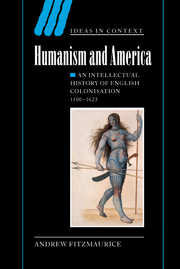Book contents
- Frontmatter
- Contents
- Acknowledgements
- 1 Introduction
- 2 The moral philosophy of Tudor colonisation
- 3 The moral philosophy of Jacobean colonisation
- 4 Rhetoric – ‘not the Words, but the Acts’
- 5 Law and history
- 6 The Machiavellian argument for colonial possession
- 7 Conclusion
- Bibliography
- Index
- IDEAS IN CONTEXT
6 - The Machiavellian argument for colonial possession
Published online by Cambridge University Press: 22 September 2009
- Frontmatter
- Contents
- Acknowledgements
- 1 Introduction
- 2 The moral philosophy of Tudor colonisation
- 3 The moral philosophy of Jacobean colonisation
- 4 Rhetoric – ‘not the Words, but the Acts’
- 5 Law and history
- 6 The Machiavellian argument for colonial possession
- 7 Conclusion
- Bibliography
- Index
- IDEAS IN CONTEXT
Summary
Historians have distinguished two attitudes in early modern Europe to the problem of the possession of the New World. The first, supported primarily by theologians, particularly the school of Salamanca, was cautious and sceptical concerning the scope of European claims to property in the New World. Opposed to the theologians, according to this account, were the humanists. Humanists were closely associated with colonial ventures – unsurprisingly, given their emphasis on the vita activa. They are said to have allowed their preoccupation with glory, particularly the glory of conquest, to encourage their unapologetic justifications of the enterprises (Sepulveda was merely one of many such enthusiasts).
This portrayal has neglected a central tension within Renaissance humanism. Humanists, as we have seen, balanced their pursuit of glory with a careful vigilance against corruption. This anxiety was in part based upon the threats of wealth and luxury that were believed to arise from conquest, but it also encompassed the related question of possession. The humanist promoters of English colonial projects were profoundly concerned with justifying the adventures, but this concern was not motivated simply by their pursuit of glory. It also reflected a fear that colonial possession would corrupt the commonwealth, or worse, would reveal the corruption of the commonwealth (both the English commonwealth and the new commonwealth which was to be established). Moreover, the promoters articulated a Ciceronian concern with justice for its own sake.
- Type
- Chapter
- Information
- Humanism and AmericaAn Intellectual History of English Colonisation, 1500–1625, pp. 167 - 186Publisher: Cambridge University PressPrint publication year: 2003



